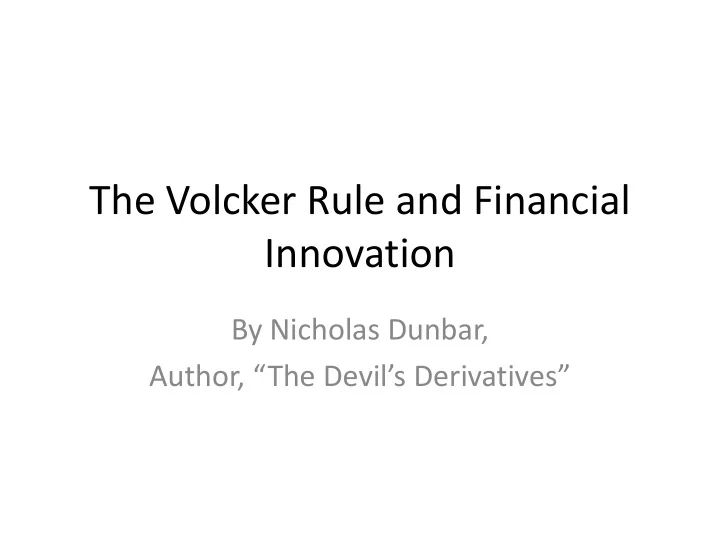

The Volcker Rule and Financial Innovation By Nicholas Dunbar, Author, “The Devil’s Derivatives”
Risk-Taking on Main Street • Research shows that normal people are risk- averse – They reject bets with payoffs skewed to the downside, even if they are mathematically worth more than upside-skewed bets • Traditional banks, pension funds etc embody this principle • Entrepreneurs are different, and drive economic progress, but they are rare and they pay a price for their visions
Wall Street’s Love -to-Win Credo • ‘Traditional’ Wall Street didn’t take much risk, and partnership structures kept it that way • The development of derivatives hedging and securitization technology (1975-95), along with changing bank ownership structures changed this • Being hedged against the downside changes human psychological perceptions of risk • To outsiders, Wall St looked the same (underwriting, market-making, asset management) but it became a shareholder- driven, love-to-win machine
How Financial Innovation Changed Wall Street • From this: Wall St Firm Risky assets Investors • To this: Risky assets Bank trading desk Special purpose Investors vehicle
Underwriting and Market-Making? • Credit spread arbitrage – Use a credit rating model to justify paying a lower return to CDO investors than market prices indicate – Lock in trading profit with SPV / CDS contracts – Looks like private-placement underwriting • Correlation trading – Pay tranched credit portfolio risk to investors via derivative or synthetic CDO – Buy senior protection from monoline, retain equity risk – Dynamically hedge portfolio with single-name CDS – Proprietary trading profit from correlation model – Looks like market-making
Derivatives Made Underwriting and Market-Making Interchangeable • Traditional Bond Underwriting – Acquire warehouse of assets, repackage them – The danger is that the underwriter chokes on its own product that it can’t sell when markets turn sour – Telecom loans in 2001, Subprime warehouses in 2007 • Credit default swaps transformed this business – Investor is now taking a long CDS position – Dealer matches them up with a short-seller – Use SPVs to turn derivatives into bond investments
Synthetic ABS CDOs 2007 – Hedging or Prop Trading? • What starts out as a matched position… Subprime risk Hedge CDO Trading Desk Funds Investors • Becomes a prop trade… CDO Trading Desk Investors • The trade served as a macro hedge for warehoused subprime risk, according to Deutsche & Goldman
Exemptions to Be Wary Of • Securities Lending – AIG’s global investment group managed assets for life entities – The group lent out securities, and reinvested cash collateral in asset-backed securities; additional returns were not paid to AIG policyholders – In 2007, lent securities were returned due to liquidity needs of counterparties, but AIG couldn’t sell ABS at par, and needed to make policyholders whole – In 2008, Fed had to bail out AIG and take ownership of ABS in Maiden Lane II
Exemptions to Be Wary Of #2 • Repo – “exclusions proposed repo positions operate in economic substance as a secured loan, and are not based on expected/anticipated events in asset pricing” (Volcker Rule NPR) – MF Global used repo-to-maturity to execute an arbitrage trade in 2011 that it couldn’t support, leading to bankruptcy
Exemptions to Be Wary Of #3 • Exchange-Traded Fund Liquidity Provision Cash commodities, ETF Investors Trading Desk Foreign exchange High-frequency Algorithmic Strategy
Recommend
More recommend